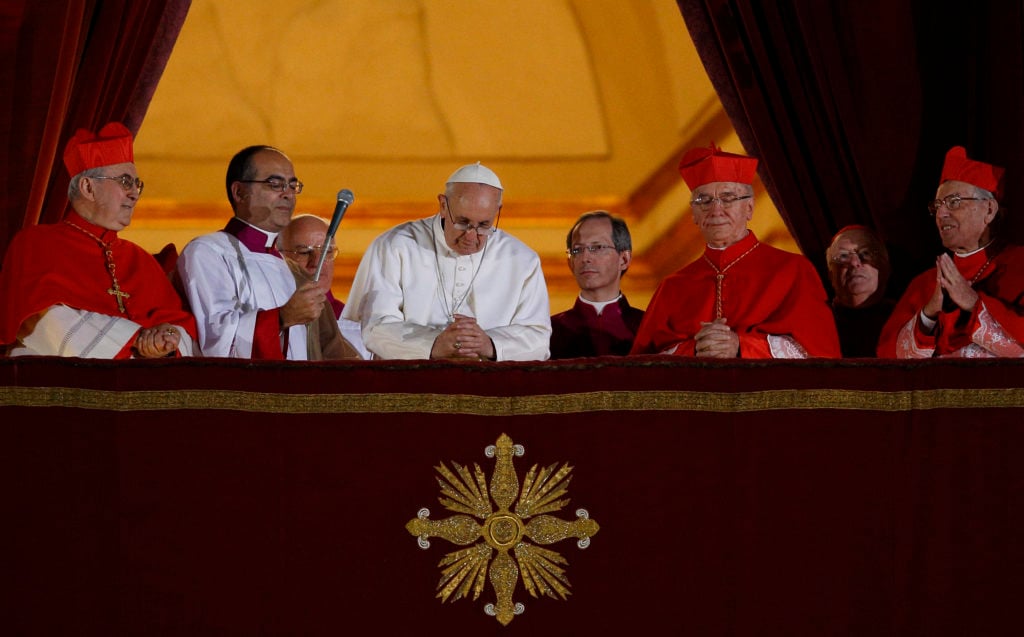A self-described “homebody”, Pope Francis will make the 10th foreign trip of his pontificate in September, visiting Cuba and then, for the first time in his life, the United States.
The visit of the 78-year-old Argentine pope comes in a year packed with important events for him: the publication in June of Laudato Si’, his encyclical on the environment; the world Synod of Bishops on the family in October; and the opening on 8 December of a special Year of Mercy.

The former Cardinal Jorge Mario Bergoglio of Buenos Aires was not a household name to most North American Catholics when he was elected to succeed Pope Benedict XVI on 13 March, 2013, but his brothers in the College of Cardinals knew who he was.
The Argentine Jesuit had been second on the balloting in the conclave that elected Pope Benedict to succeed St John Paul II in 2005.
His growing up with four siblings in a family with strong ties to its Italian origins, his training and ministry as a Jesuit – including what he says were mistakes as a provincial superior – and his regular contact with the poorest residents of Buenos Aires are influences seen in his preaching, priorities, style of governance and, especially, in the way he interacts with individuals.
The pope signalled just how strong those influences were almost immediately after his election. The first sign was his decision not to live in the Apostolic Palace, but in the Vatican guesthouse where the cardinals stayed during the conclave.
He told reporters it was a matter of liking to have a lot of people around and not a statement about simplicity or austerity, although he said both are essential for every minister in the church.
As he settled into his new life as pope, he shook up much of what had become tradition with a small “t” in the Vatican. He cold-called Vatican officials to check on the progress of projects; he kept his own schedule in the afternoon, phoning people who had written to him or inviting them over for a chat; he lectured clerics on the need for simple lifestyles; and he repeatedly condemned office gossip and clerical careerism.
Early in his pontificate, Pope Francis named an international panel of cardinals – most of whom head dioceses, not Roman Curia offices – as an advisory panel for church governance. Their first big task, one that is ongoing, is to reorganise the Vatican bureaucracy.
While the bulk of the project has not been completed, the pope accepted the cardinals’ recommendations to establish a council and secretariat for economic affairs, a secretariat for communications and a commission to promote child protection. They already are at work.
Just eight months after taking office, Pope Francis published his apostolic exhortation, The Joy of the Gospel, a detailed vision of the program for his papacy and his vision for the church – particularly the church’s outreach and its response to challenges posed by secular culture.
In the document, the pope called on Catholics to go out into the world, sharing their faith “with enthusiasm and vitality” by being living examples of joy, love and charity. “An evangeliser,” he said, “must never look like someone who has just come back from a funeral.”
Jorge Mario Bergoglio was born in Buenos Aires on 17 December, 1936. He earned a chemical technician’s diploma from his high school and entered the Jesuit novitiate in March 1958.
As part of his Jesuit formation, he taught literature and psychology at Jesuit high schools in the mid-1960s, and he was ordained to the priesthood on 13 December, 1969.
In 1973, he was appointed superior of the Jesuit province of Argentina. “I was only 36 years old. That was crazy. I had to deal with difficult situations, and I made my decisions abruptly and by myself,” he said in an interview after becoming pope. “My authoritarian and quick manner of making decisions led me to have serious problems and to be accused of being ultraconservative.”
In 1992, Pope John Paul II named him an auxiliary bishop of Buenos Aires. He was promoted to coadjutor archbishop in 1997 and became head of the archdiocese in 1998; St John Paul named him to the College of Cardinals three years later.
